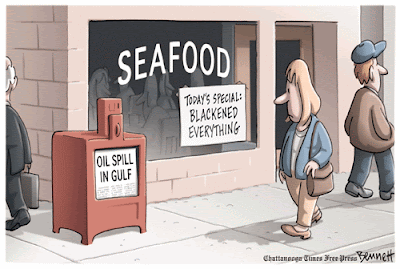[credit: Clay Bennett, Chattanooga Free Press]
"Twenty-four miles of Plaquemines Parish is destroyed. Everything in it is dead," head of the parish in southern Louisiana, told US cable news station MSNBC Thursday.
"Twenty-four miles of Plaquemines Parish is destroyed. Everything in it is dead," head of the parish in southern Louisiana, told US cable news station MSNBC Thursday.
Louisiana state officials are reported to be furious with BP's lackadaisical response to the disaster. The company seems satisfied to sit back and wait for the relief well to be drilled while disputing independent accounts about the actual size of the spill. Only two undisputed facts are important right now: 1)the spill is huge, and it is headed inland to contaminate fragile and productive wetlands because the company did not take immediate, effective action to contain the flow during the first days of the catastrophe; 2) the government is partly at fault for engendering an attitude within the industry that it is immune from regulation and public accountability.
Environmental groups like the World Wildlife Fund are calling for a new drilling moratorium until the Deepwater Horizon disaster has been studied by an independent commission. Shell Oil is preparing to drill exploratory wells up to 140 miles from shore in the Arctic Ocean, known for its extreme weather conditions. The same amount and variety of resources in the Gulf of Mexico to contain and clean up a major oil spill are not available in the Arctic. There is considerable doubt even if conventional equipment were available, that it could be effective in the harsh conditions. The Minerals Management Service said in a 2009 paper, "field deployment of booms and skimmers in broken ice conditions in the Beaufort Sea highlighted the severe limitations of conventional equipment in even trace concentrations of broken ice." Detection of oil slicks under ice is also a technical challenge. Ground penetrating radar can be used to locate slicks of oil 1" thick or more in ideal conditions. It cannot detect oil slicks when the ice is thicker than 7", or 3" when the radar is used from the air. There is only one GPS unit in the Alaskan Arctic at present. Burning can an effective way to eliminate thick oil slicks on the surface, but a subsurface blowout like the Deepwater Horizon well will produce emulsified oil (oil-seawater mix) that is very difficult to burn. Chemical dispersants are toxic and spread an already toxic substance throughout the water. Clearly, given the present state of spill prevention and clean up technology, offshore drilling in the Arctic is not a reasonable course when the adverse impact of a major spill on wildlife and native peoples is considered.
